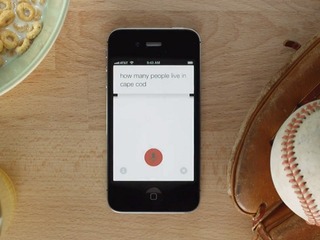DUOS expands AI capabilities to help seniors apply for assistance programs
It will complete and submit forms, and integrate with state benefit systems
Read more...
Just as it did with its Maps app, Google is once again looking to take Apple head on on its own turf. And, this time, it is going to be taking on one of Apple's most recognizable features.
Google Now, the company's answer to Apple's Siri personal assistant, is now being made available on iOS via an update to the Google Search app.
It will be available on both the iPhone and the iPad, but, unlike Google Now for Android, where it is a built in function, iOS users will have to sign into their Google account in order to use the service on their devices.
Google Now is an intelligent personal assistant which has been available on Android since it introduced Jelly Bean in June 2012.
The way it works is that it recognizes repeated actions that a user performs on their device, such as common locations, repeated calendar appointments, and search queries, in order to display more relevant information to the user in the form of "cards". Information is pulled from multiple Google services, including Search, Gmail, Calendar, Maps and Chrome browser history.
For example, the app can give weather and traffic conditions before a users start their day, updates on their favorite sports teams and breaking news stories as they happen or can tell a user what the weather will be like on their way home.
"Google Now is about giving you just the right information at just the right time. It can show you the day’s weather as you get dressed in the morning, or alert you that there’s heavy traffic between you and your butterfly-inducing date—so you’d better leave now! It can also share news updates on a story you’ve been following, remind you to leave for the airport so you can make your flight and much more. There’s no digging required: cards appear at the moment you need them most—and the more you use Google Now, the more you get out of it," Andrea Huey, Engineer at Google, wrote in a blogpost about the news Monday.
Since it is available on Android The iOS app will also be missing some cards available on the Android version, including Boarding Pass, Activity summary, Events, Zillow, Fandango, and Nearby events.
This is not the first step that Google has taken to challenge Siri on iOS. In October, Google added voice searching to its Search app for iOS. With the voice recognition features, the words appear as the users speaks them. The answers are given immediately, and are spoken out loud if the answer is short, for example is asking if a flight is on time.
The combination of Google Now's intelligent searching, along with the ability to voice search, make the Google Search app a real competitor to Siri. Although the app does not integrate with the phone the way that Siri does, and will bring up traditional Google searches, the intention is clear: give iOS users a clear alternative to their only personal assistant.
"Together, Google Now and voice search will make your day run a little smoother," Huey wrote.
(Image source:
It will complete and submit forms, and integrate with state benefit systems
Read more...The bill would require a report on how these industries use AI to valuate homes and underwrite loans
Read more...The artists wrote an open letter accusing OpenAI of misleading and using them
Read more...Startup/Business
Joined Vator on
Siri is a Virtual Personal Assistant - a new way to interact with the Internet on your mobile phone. Like a real assistant, Siri helps you get things done. You interact with Siri by just saying, in your own words, what you want to do. You can ask Siri to find a romantic place for dinner, and get reservations for Saturday night. You can discover things to do over the weekend, get tickets to the movies, or call a cab when you’re out on the town. You don't have to search through a bunch of web pages, following links and hunting down facts. Siri does all the work giving you the information you need at your fingertips.
We believe that in five years most people who use the Internet will have a Virtual Personal Assistant (VPA) to take care of the details of using online services. We will look back at the birth of VPAs in 2009 and wonder how we ever got by without our trusted assistant. The days of wading through links and pages from your mobile interface will seem quaint, because the natural way to interact with the rich world of information and services is to have a conversation. As John Batelle, the author of The Search, says "The future of search is a conversation with someone we trust."
